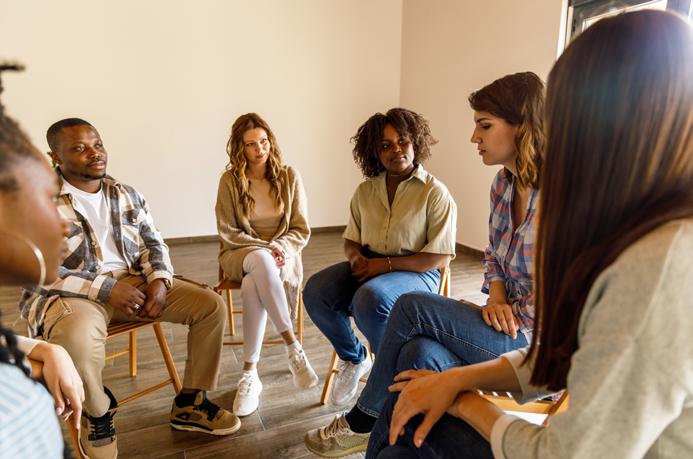
4 minute read
Anne Davies: The Benefits of Group Therapy
Anne Davies is a Warnham-based UKCP psychotherapist trained in Transactional Analysis. She explains why we all have the capacity to change and decide our own destiny...
Talking therapies involves talking about your thoughts, feelings and behaviour to a trained professional.
There are different types of talking therapy, but they all aim to give you a safe time and place to talk to someone who won’t judge you, to help you make sense of things, resolve complicated feelings and recognise unhelpful patterns in the way you think and act.
A mandatory requirement for my qualification as a psychotherapist was to undertake personal psychotherapy during the four-year course, so I have experienced what it’s like to be a client. I admit I did not know what to expect, however therapy has helped my personal and professional development, raising self-awareness, emotional resilience and confidence in my skills. Personal psychotherapy also offered me a powerful form of experiential learning in which I got to see for myself how our individual patterns of relating to ourself and others, play out in therapy.
GROUP THERAPY
In individual therapy, the focus is solely on you and your specific needs and goals. You have the undivided attention of your therapist, which allows for a more personalised approach. Group therapy, on the other hand, offers a unique opportunity for social support and learning from others’ experiences.
You’ll need to be comfortable sharing personal information with others and may find that hearing how others cope with similar challenges gives you a fresh perspective on your situation. Also, you will have the experience of being in a group held by a qualified psychotherapist.
Groups are run on the same sorts of principles as those seeking individual psychotherapy. For this reason, it is usually considered that anyone who might benefit from individual psychotherapy might also benefit from the group option. That said, you do not need to be in individual therapy to benefit from group therapy.
The group offers an opportunity to learn about how others might see you, and the types of interaction you tend to get into with other people. You may, for example, feel that you try too hard to help people, or feel that you never fit in, easily become offended, or that you avoid certain situations of conflict. The group can lessen a sense of isolation, as you realise there are other people in the group who may have had similar experiences and/or difficulties.
Unlike individual psychotherapy, it is possible to take up different roles in a therapy group; you might explore your own feelings in the group, but also be in a position to observe and comment on the struggles of other group members. You may find that you can both help and be helped by other people. Our experience in group settings can be mixed. You may feel that you don’t know who you are in a group situation, that you have no identity, or lots of
different contradictory identities. There may have been an issue in your family of rivalry and jealousy between siblings and these sorts of feelings may get stirred up in other group situations. The aim of group therapy is to increase your knowledge and self-awareness and bring about a degree of personal change.
ANXIETY & RELATIONSHIPS
The groups I run are theme based, for example anxiety or relationship problems. To ensure people join a group appropriate to them, I arrange a free individual consultation to learn what it is that brings you to therapy, what you want to get from it and I can tell you about how I work too. This time provides you the opportunity to decide if you feel comfortable with me and for me to consider whether I am the right therapist for you. This can be online or a phone call and gives you the opportunity to raise any concerns or questions you may have.
There are various groups run throughout the year from venues in Warnham or Horsham. Each group has up to eight people and runs for six weeks, with continuity of members. They are held on Fridays or Saturdays. For prices and for more information, please get in touch.
To arrange your consultation, email anne@mattersofemotion.co.uk or visit www.mattersofemotion.co.uk


